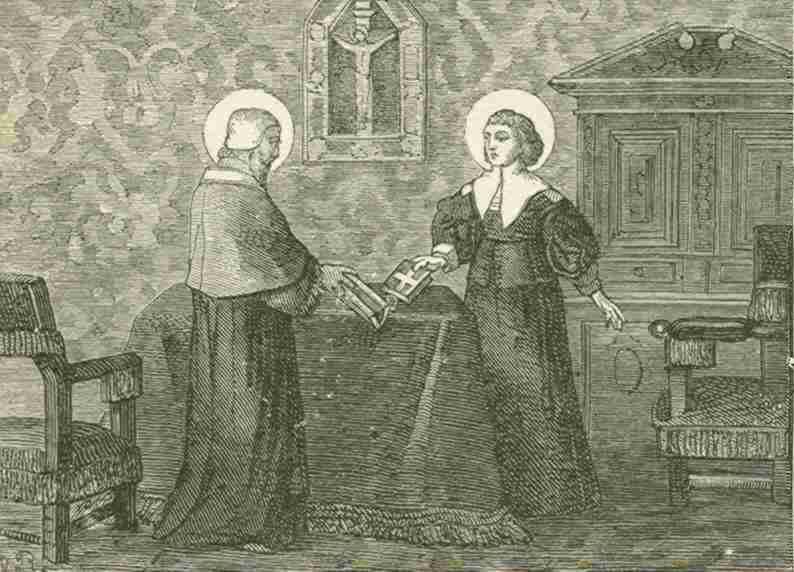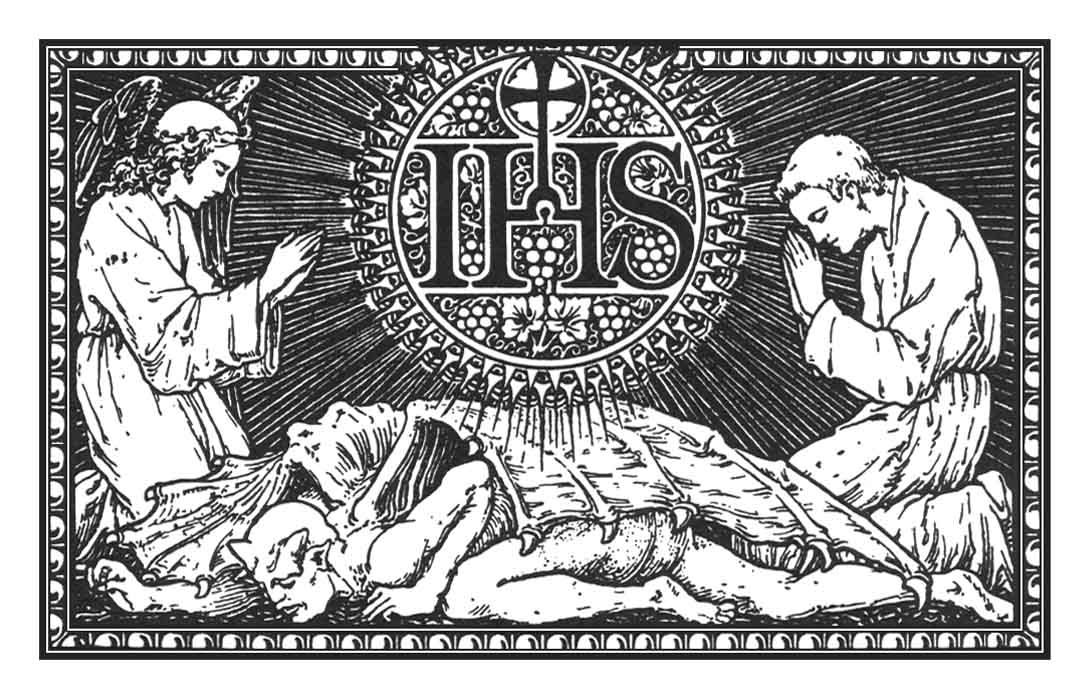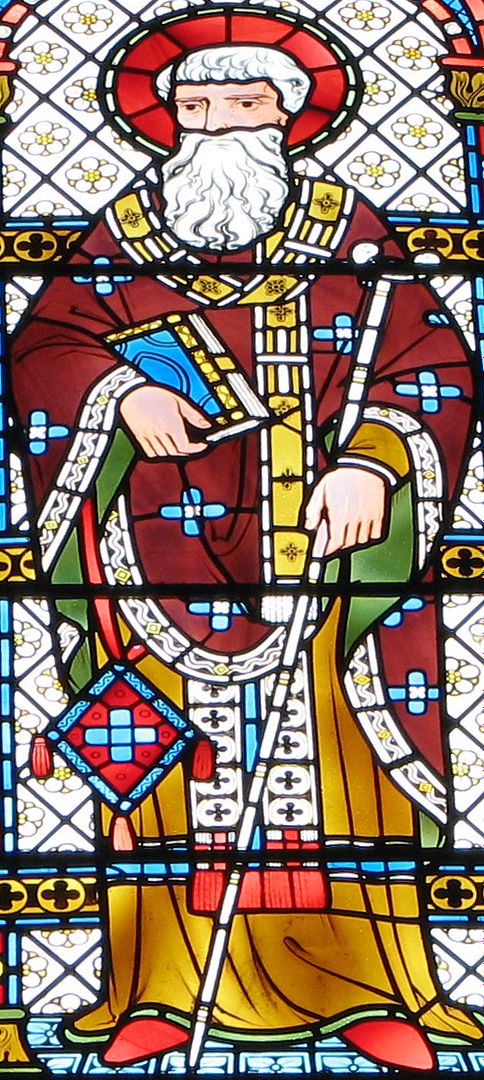Jane Frémoit de Chantal was born at Dijon, France in Burgundy, of noble parents. From an early age, Jane demonstrated clear signs of her future sanctity. It was said that when she was only five years old, she outwitted a Calvinist nobleman by substantial arguments-- arguments far beyond her age. In conciliation, he offered her a small present, which she immediately threw into a nearby fire, proclaiming: “This is how heretics will burn in hell, because they do not believe Christ when He speaks.”
Jane lost her mother at an early age, and from that time, put herself under the care of the Blessed Virgin, Mother of God. Her father, president of the parliament of Borgoa, provided her with the best education available at the time, as well as in the ways of faith and virtue. Jane took the message of Christianity to heart, dismissing her servant (while still a child), as she worried that the servant’s presence would entice her to love the world and privilege, and cause her to sin. Instead, she shrank from worldly pleasures, devoting herself entirely to religious pursuits, and longing for martyrdom. She took the name Frances at her confirmation.
As was the custom of the time, when Jane turned 20 her father arranged a marriage for her, which she obediently accepted. She was married to the Baron de Chantal, a young soldier with proud military accomplishments. In this new state of life she strove to cultivate every virtue, and busied herself in instructing in faith and morals the children the couple produced (their first three children died shortly after birth, but the young spouses later had a boy and three girls), her servants and all under her authority. The Baroness loved her husband very much, dressing in a very modest way when he was traveling. If someone was to ask her why, she responded: “The eyes of who I want to please are very far away.”
Jane devoted herself to sharing the wealth of the household with the poor, and as reward, received miraculous provisions in her storehouse. On more than one occasion, when she believed her larder to be empty, it was miraculously filled by the Lord. On this account, she promised to never refuse anyone who begged for alms in the name of Jesus.
Jane was to experience great suffering, however. After nine years of marriage, her husband was wounded in a hunting accident, and died nine days later at the hands of unskilled surgeons. Jane, following a period of depression and listlessness, resumed the duties of her household, caring for her children, and doubling her efforts in service to the poor. She reached out to the man who had shot her husband, forgiving him, providing his household with necessities, and becoming Godmother to his children.
Jane recommitted herself to the Lord, vowing a life of chastity from that time on (she was only 28!). She streamlined her home, living more modestly, donating excess to those in need. She traded her fine garments for simple, modest dresses. Her gowns and fineries she donated to the Church to be converted into fine religious garments.
Jane Frances spent the majority of each day (when she wasn’t serving the poor) in prayer, pious reading, and works. Bound by vow to Jesus Christ, she received a number of honorable and advantageous offers to re-marry, but declined them all. To strengthen her resolve of observing chastity, Jane imprinted the most Holy Name of Jesus Christ upon her breast with a red-hot iron. Her love for all grew, and she had the poor, the abandoned, the sick, and those who were afflicted with the most terrible diseases, brought to her. Not only did she shelter and nurse them, she comforted them, washed and mended their filthy garments, and did not shrink from putting her lips to their running sores.
Wishing for still higher ascensions in her heart, she bound herself by a most difficult vow always to do what she thought most perfect. She prayed to God incessantly to provide her with a holy spiritual director, capable of helping her perfectly fulfill God’s will. Once, following this prayer, she was rewarded with a vision of a man whom she would later recognize as Saint Francis de Sales. That recognition occurred in 1604, as Saint France preached a Lenten homily in Dijon.
Saint Frances eventually became Jane’s spiritual advisor, and instructed her in the ways of balance, encouraging her to relax some of her harsher penitential practices, and spend more time tending to the duties of her household—namely her children and her aging father-in-law. With his guidance, Jane was able to balance the urgings of her heart to the Lord with her many responsibilities in the world. Someone once said of her, “This lady is capable of praying all day without bothering anyone.” Following a strict rule of life, consecrated for the most part to her children, she visited the sick in the area and spent entire nights in vigils next to the agonizing and dying.
The benevolence and meekness of her character demonstrated how far she responded to the demands of grace since her natural this strict demeanor through long years of prayer, suffering and patient submission to spiritual direction. This was the work of St. Francis de Sales, whom Jane Francis visited on and off in Annecy and with whom she had fruitful correspondence through letters.
Following some years of spiritual direction with Saint Frances, Jane felt drawn to the religious life, and was inclined to enter a convent. Together, the two prayed about her vocation, and in 1607, Saint Frances announced his intention to found a new order—the New Congregation of the Visitation. With great joy, Jane embraced the project, but her joy was to be short lived as her father’s age and illness, as well as the continued education of her children, required her to delay her involvement, and suffer much in the world. Saint Frances directed her that her children were no longer little and that from the cloister she was better able to care of them, especially taken into account that the two elders were old enough to “enter the world” and care for their grandfather. In this logical and serene way, Saint Francis resolved her difficulties.
Before abandoning the world, Jane Francis kneeled before her father, crying, and asking his blessing. The elderly man put his hands on her head and said: “I cannot reproach your actions, go with my blessing. I offer you Lord, my daughter, as Abraham offered Isaac, whom he loved so much as I love you. Go where God calls you and be happy in His house. Pray for me.”
A new convent was built at Annecy, and Jane entered it on Blessed Trinity Sunday in the year 1610. Shortly afterwards, fifteen women entered the order, including two of Jane’s daughters. While no formal rule had been developed yet, the congregation’s purpose was that it should be a source of refuge to those who couldn’t enter other congregations and that the religious sisters should not live in cloister in order to dedicate themselves to apostolic works of charity. Due to opposition from both within and outside the Church, the plans were eventually modified, and the women accepted the cloister and adopted the Rule of Saint Augustine. Saint Frances wanted humility and meekness to be the base of the religious observance. “But in practice,” he said to the religious, “humility is the fountain of all other virtues; don’t limit humility, make of it the principal one of all your actions.”
Saint Jane took her vows and was made Mother Abbess of the convent. She traveled throughout the region, establishing new convents (65 in all) and bringing more and more young women to God. Many of these women were of nobility, giving up their station and privilege, and committing to the humble and charitable order.
In 1622, Saint Francis de Sales died and his death constituted a harsh blow for Mother de Chantal; but her resignation to Divine Will helped her embrace all with invincible patience. Her son was killed in battle shortly thereafter. Saint Jane received the news of her son’s death with heroic fortitude and offered her heart to God and said: “Destroy, cut and burn all that opposes your holy will.”
Saint Jane Frances fell ill while visiting the convent of Moulins, where she died on December 13th, 1641 at the age of 69. Her body was taken to Annecy—her first convent-- and buried close to Saint Francis de Sales. At the time of her death, Saint Vincent de Paul was visiting, and reported a vision of Saint Frances escorting the pious saint to heaven. He said of Saint Jane Frances:
“She was a woman of great faith, and had temptations against the faith all her life. Even though she appeared to have reached the peace and tranquility of spirit of virtuous souls, she suffered terrible interior trials which she communicated to me on several occasions. She seemed so harassed by abominable temptations that she had to take her eyes away from herself so as not to contemplate her unbearable state. To look at her soul horrified her as if it was an image of hell. But through these great sufferings she never lost her serenity, yielding with joy to what God wanted from her. That is why I consider her as one of the most holy souls I have met on earth.”
Saint Jane Frances de Chantal left behind a legacy of service, suffering, meekness, and obedience. She was willing to soften herself, giving up control of her life to the Lord, and following the direction given to her. Not without loss and sacrifice, her life was difficult—all of which she embraced with patience and joy. When the daily struggles of our lives become too great, we might think of the message of Saint Jane Frances: “You want to be humble? Try to know yourself well; desire for others to know you as imperfect; love contempt, in all its forms and in any which way it may come. Don’t hide your defects; let them be known, accepting with love the abjection that will come by them. Never let your heart to be weakened because of a fault committed. Distrust self and trust only and continuously in God, persuaded that not able to do anything by yourselves, you can do all with His grace and powerful help.”
Saint Jane Frances de Chantal's reflections on prayer
Saint Jane Frances de Chantal: "The Martyrdom of Love"
Selection Quotations of Saint Jane Frances de Chantal:
"When shall it be that we shall taste the sweetness of the Divine Will in all that happens to us, considering in everything only His good pleasure, by whom it is certain that adversity is sent with as much love as prosperity, and as much for our good? When shall we cast ourselves undeservedly into the arms of our most loving Father in Heaven, leaving to Him the care of ourselves and of our affairs, and reserving only the desire of pleasing Him, and of serving Him well in all that we can?"
"We should go to prayer with deep humility and an awareness of our nothingness. We must invoke the help of the Holy Spirit and that of our good angel, and then remain still in God's presence, full of faith that he is more in us than we are in ourselves."
"Hold your eyes on God and leave the doing to him. That is all the doing you have to worry about."
“Jesus Christ is a great Lord, rich and powerful, who doesn’t have necessity of our goods. What gift can we give Him if the whole world is his? It is necessary to offer Him pure souls and clean hearts, white and empty of all earthly things; notice that our souls are to be very clean to be able to be offered to the Divine Child, who is born on this day, creator of all purity and holiness. This is the most pleasing gift we can give: a clean heart, contrite and humble. He only wants from us our hearts.”
“My dear daughters, let us not have illusions; it is necessary that for our affection, to be blessed by God, it has to be equal and uniform for all, for our Savior has not ordered us to love some more than others, but He has said: Love your neighbor as yourself.
Sometimes we think our affections are very pure; but before God it is very different; the affection that is all pure looks only at God, only aspires to God and does not pretend anything but God. I love my sisters because I see God in them and because God wants it this way . . . your charity is false if it is not equal, general and complete with all the sisters, this way your are to be gentle with one sister as well as with the other.
The motive behind the love you profess for your sisters should only come from the womb of God; if it is outside of it, then it is worth nothing . . . . When this union with our sisters is more pure, more general and more complete, only then will our union with God be greater.”
“It is true my dear daughters, it is lack of self knowledge that amazes us when we see ourselves so lacking and with defect, because we presume or boast so much of ourselves, that we always expect something good; we deceive ourselves, and Our Lord himself allows us to fall, many times in a stupid, clumsy way, so we can know ourselves better. This knowledge of self consists in that we should believe, with certitude and faith, that we are nothing, we can do nothing; we are weak, feeble and imperfect. Decide in your will to love your misery and poverty. The reformation of the soul starts in self knowledge and confidence in God; our self knowledge will let us know we have many things to correct and reform and it cannot be done by our own efforts; confidence in God will let us hope in Him, we can do all in Him, and with His grace all things are possible and easy.”
“Perhaps at some time it will occur that a sister has bothered us, or did something not pleasing to us, or that simply we don’t have a liking for her. Another sister will come to us and speak well of her, and we might answer with half words putting down all the good. This will produce the effect of a drop of oil that falls on fabric, an incurable spot on the heart of the sister we are talking to. All the bad the sister might have done in consequence of this bad impression we have caused will be on our conscience, and we will be guilty of it and punished severely. God said he hates six things, but the seventh he abominates: those who divide hearts and plant discord among brothers.”
“When we have conquered ourselves we have done a good action, and feel some satisfaction and pleasure, this ruins everything, making us lose all if we are not careful. What a disgrace after making sacrifices, self denial of attitudes or words or any other thing, we end up satisfying ourselves! Never or rarely, is good done without some satisfaction and this is not bad in itself; what ruins all is to distract ourselves and to seek pleasure in it. What are we to do? We have to chase away and annihilate all thoughts of pleasure and vain satisfaction, humble ourselves and seek contempt, give God the glory for everything and recognize we can do nothing on our own. We are only to seek the Glory of God in everything and to do all to please Him.”
“If someone wants to follow me, renounce self . . . ”“These words are the foundation of all Christian and religious perfection. To deny self is to renounce to all the will of the flesh, all our inclinations, desires, pleasures, satisfactions, softness, tastes, humor, preferences, habits, susceptibility, aversions and repugnance to rough things; in other words, to renounce in all and for all our perverse self. Fight to destroy your character, passions and inclinations; in one word, all your nature; and this, with energetic will, with generosity, and persevering mortification of all your being.
It is necessary to know we are to only mortify the imperfect inclinations of bad things, and not the good or the tendency to the good; for example; I’m sent to do a task and I feel inclined to do another one; we have to mortify this inclination and submit it to obedience. But if I’m sent to do a task I like, we are not by any means to mortify our inclination and reject the task, but we are to offer God the work and say: I do it not because of the inclination I feel, but because obedience requests it (in the case of lay people: I do it for love of God or because it is my obligation).”
Lord, you chose Saint Jane Frances to serve you both in marriage and in religious life. By her prayers help us to be faithful in our vocation and always to be the light of the world. We ask this through our Lord Jesus Christ, your Son, who lives and reigns with you and the Holy Spirit, one God, for ever and ever. Amen.
Year 2: Day 224 of 365
Prayer Intentions: Simple obedience; Hearts of charity.
Requested Intentions: Recovery and health of a mother (J); For a family to grow closer to the Church, salvation for all children (D); Successful employment (L); Successful employment (S); Renewal of faith life (A); Support for an intended marriage, health for friend and aunt (J); Mental health assistance for son (G); Freedom from illness (S); Successful employment (C); Financial assistance and employment (B); For a family’s intentions (T); Successful examination results (B); Healing of a friend with cancer, for all those who help others (B); Healing and love (L); Grace and healing (V); Healing of a heart, consecration of a marriage (M); Health of a family, intentions of apostolate (H); For repentance (J); For a family in trouble (R); Healing, successful relationships for son, financial success (J); Success of a company (L); For a religious society (J); Healing of a husband, strength as a faithful caregiver (D); Healing of a son (T); Financial security, Healing and guidance (M); Healing of a heart and relationship (V); Employment for daughter (J); For a marriage that glorifies the Lord (K); Resolution of family situation, parents’ health (A); Positive results (C); For a son’s employment, faith, and relationships (S).




































































